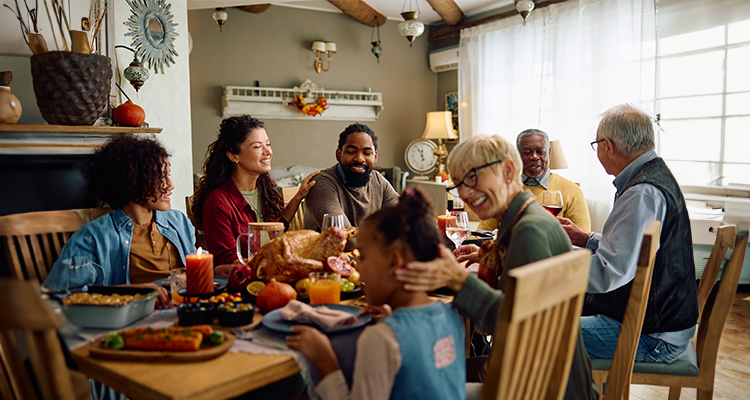Navigating the Holidays: Practical Strategies for Mental Well-Being
The holidays are often painted as a time of joy, connection, and celebration, but for many, the season brings its own set of challenges. On one hand, the holidays offer opportunities for connection and celebration. On the other, they may highlight struggles such as loneliness, financial pressure, or the grief of missing loved ones. The holidays can amplify both joy and stress.

Recognizing this duality is the first step in approaching the season with clarity and compassion—for yourself and others. For those in caregiving roles, there’s an added layer: the emotional toll of supporting others through these challenges while managing your own. If the holidays feel more like a storm to weather than a time of peace, you’re not alone. Here are some strategies to help you and those you serve navigate the season with resilience and intention.
Seven Ways to Create More Peace This Holiday Season
Set Realistic Expectations
The “perfect” holiday is a myth. Let go of the idea that everything needs to be just right. Take time to make a list of what is most important to you. Research shows that simply lowering your expectations isn’t an effective strategy. Instead, identify what you want and work towards those goals. Focus your time and energy on what’s meaningful and give yourself permission to say no to things that don’t align with your priorities.

Prioritize Self-Care
Self-care is defined as the ability to care for oneself through awareness, self-control, and self-reliance in order to achieve, maintain, or promote optimal health and well-being. During the holiday season, routines can sometimes take a back seat. This holiday season, make time to care for your body so that you can keep up with the pace of the season. Simple habits like staying hydrated, sticking to a sleep routine, and getting outside for fresh air can help recharge your batteries, allowing you to show up for what’s most important to you.

Boundaries Are Your Best Friend
Boundaries are the limits we establish with ourselves and others to prioritize our well-being. Without them, we risk depleting our time, energy, and resources by focusing solely on making others happy, often neglecting our own needs for rest, fun, connection, and quiet. This can leave us feeling resentful, exhausted, unfulfilled, and overwhelmed. Boundaries are an essential form of self-care that help reduce conflicts and misunderstandings. It’s important to remember that it’s okay to say no—even during the holidays. Whether it’s declining a social invitation or managing difficult conversations, healthy boundaries can help prevent burnout. Practice saying no with kindness: “I appreciate the invitation, but I can’t commit this time.”

The Importance of Awareness
Awareness is a powerful tool for navigating holiday stress. Take a moment to identify which aspects of the season feel most overwhelming. Is it overcommitting to social events? Strained family relationships? The weight of perfectionism? Once you identify your triggers, you can develop strategies to address them. Mindfulness practices, journaling, or even a quick check-in with yourself can help you stay grounded and focused on what truly matters.

Navigating Substance Use During the Holidays
The holidays often involve celebrations where alcohol or other substances are present, which can be especially challenging for individuals in recovery or those striving to reduce their use. For those in recovery, planning ahead is key—bring a sober buddy, create an exit strategy for uncomfortable situations, and communicate your needs by letting others know you’re not drinking, such as saying, “I’m taking a break from alcohol” or “I don’t drink, but thank you.” Having alternatives, like your own non-alcoholic beverage, can help you feel included. Leaning on support through recovery meetings or connecting with your network, especially during holiday-specific gatherings, can provide additional strength.
For those managing their use, it’s important to set limits in advance. Pace yourself by alternating alcoholic drinks with water or non-alcoholic options, and stay mindful of triggers that might lead to heavier use. Plan healthy coping strategies to address those triggers. Focusing on meaningful connections, such as playing games, sharing stories, or engaging in activities, can help shift the focus away from drinking.

Foster Connection
The holidays, often seen as a time for gathering, can feel isolating for those who feel disconnected. To nurture connection, seek out supportive relationships or join community events if loneliness becomes a concern. Virtual gatherings can also provide a sense of connection without added stress. Additionally, prioritize spending time with people who uplift and energize you. Surrounding yourself with those who truly understand and support you can help you feel recharged and connected during the holiday season.

Handling Grief and Loss During the Holidays
The holidays can amplify feelings of grief, especially during the first few seasons after a loved one’s passing, as their absence highlights how life has changed. Psychologists emphasize the importance of acknowledging that the holidays will be different and planning proactively to minimize anxiety, such as adjusting traditions, locations, or gathering times. Balancing grief with celebration is essential, as is holding space for both loss and the connections with those still present. Including the memory of the deceased in meaningful ways—like sharing stories, creating memorials, or continuing cherished traditions—can provide comfort and keep their presence alive. Ultimately, grief during the holidays is deeply personal, and finding meaningful, individualized ways to navigate it can help ease the emotional challenges of the season.

The holidays often embody a unique duality—navigating the whirlwind of holiday demands with the natural pull towards honoring the season of winter—intentionally slowing down and resting. On one hand, the holiday season demands energy and participation—shopping, attending events, cooking, and socializing—generating a frenzy of tasks that can leave little room for rest. The expectations of joy, celebration, and togetherness can intensify the rush, leaving many people feeling depleted, drained, or overwhelmed. On the other hand, winter itself encourages a slower pace. As nature enters a period of dormancy, the cold, dark months prompt us to seek rest, introspection, and renewal. Wintering is a natural rhythm, a time to retreat from the world, conserve energy, and reflect. This cycle of rest feels at odds with the hustle of the holidays, yet it offers a crucial counterbalance. In the midst of the seasonal rush, we can honor the need for stillness by carving out moments of peace, quiet, and self-care.
The challenge is finding harmony between these two forces: embracing the joy and connection the holidays offer while also recognizing the importance of slowing down, recharging, and honoring our need for solitude. By integrating wintering into the holiday season—whether through moments of quiet, reflection, or creating space for rest—we can navigate the busyness with more balance, peace, and presence, allowing us to experience the season more fully. This holiday season, take the time to care for yourself by honoring your needs, focusing on what truly matters, and connecting with those who uplift and support you. By doing so, you’ll create a season that nourishes both your well-being and your relationships.
References
Cho CK, Cho TS. On Averting Negative Emotion: Remedying the Impact of Shifting Expectations. Front Psychol. 2018 Nov 20;9:2121. doi: 10.3389/fpsyg.2018.02121. PMID: 30524327; PMCID: PMC6256416.
Martin, S. (2021, December 16). Healthy holiday boundaries: Happy holidays are built on setting healthy limits. Psychology Today. https://www.psychologytoday.com/us/blog/conquering-codependency/202112/healthy-holiday-boundaries
Martínez N, Connelly CD, Pérez A, Calero P. Self-care: A concept analysis. Int J Nurs Sci. 2021 Sep 5;8(4):418-425. doi: 10.1016/j.ijnss.2021.08.007. PMID: 34631992; PMCID: PMC8488814.
May, K. (2020). Wintering: The power of rest and retreat in difficult times. Penguin Random House.
Morgan, T. (2018). Are you grieving this holiday season? Here are ways to cope with loss and honor loved ones. American Psychological Association. https://www.apa.org/topics/grief/holiday-season-coping
OpenAI. (2024). ChatGPT (Version 4) [AI language model]. Assisted in generating ideas and editing content for improved flow in the blog post on navigating holiday challenges. Retrieved November 18, 2024, from https://chat.openai.com
Blog Post Tags:
Related Blog Posts
Related Learning Labs
Related Resources
.
- Buscar Tratamiento de Calidad para Trastornos de uso de Sustancia (Finding Quality Treatment for Substance Use Disorders Spanish Version)
- Finding Quality Treatment for Substance Use Disorders
- Focus On Prevention: Strategies and Programs to Prevent Substance Use
- Monthly Variation in Substance Use Initiation Among Full-Time College Students
- The National Survey on Drug Use and Health (NSDUH) Report: Monthly Variation in Substance Use Initiation Among Adolescents








